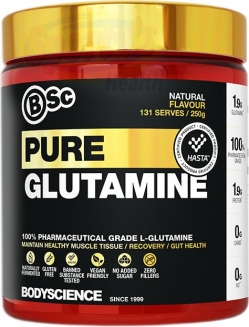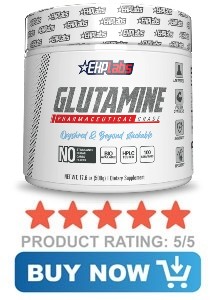Ingredient Review: L-Glutamine

L-Glutamine has been a popular supplement for many decades in the sports nutrition and health arenas. This amino acid is often added to intra-workouts, pre-workouts, mass gainer shakes, greens powders, digestive wellness blends and a range of other health supplements.
Most L-Glutamine is derived from a process of bacterial fermentation, as opposed to synthetic production.
What is L-Glutamine
L-Glutamine is a conditionally-essential amino acid required for protein synthesis. In the human body, L-Glutamine is produced from glutamic acid via the enzyme glutamine synthetase.
Glutamic acid is a non-essential amino acid found in high quantities in a range of foods, including milk, mushrooms and fish.
What does L-Glutamine do?
L-Glutamine is a fuel source for a range of cells, including immune cells, enterocytes (in the gut) and neurons in the brain.
During hypercatabolic situations, such as sepsis or after trauma, L-Glutamine may actually become an essential amino acid.
Evidence indicates that L-Glutamine offers ergogenic benefits and promotes recovery after exercise, particularly for athletes who are overtraining.

Specific Research Results
American Journal of Physiology
Evidence indicates that when L-Glutamine is consumed after aerobic exercise (90 minutes of cycling), muscle glycogen levels restore faster.
In this study, published in 1995, L-Glutamine was compared to Alanine + Glycine and Saline. Glutamine supplementation was shown to be far superior with a p factor of <0.05.
International Journal of Sports Nutrition and Exercise Metabolism
In this article, the authors suggest that L-Glutamine supplementation increases peak torque during exercise, and reduces muscle soreness.
What Sports, Exercises or Health Conditions may L-Glutamine benefit?
L-Glutamine supplementation may be of benefit for “leaky gut syndrome” (hyper-permeable intestinal mucosa) and chronic inflammatory conditions of the gut, such as Crohn’s Disease.
 In addition, supplementation may assist with immune suppression, especially when related to high levels of physical activity.
In addition, supplementation may assist with immune suppression, especially when related to high levels of physical activity.
Regarding sports and exercise, L-Glutamine may assist with power in training and recovery, particularly when taken after endurance exercise with a carbohydrate source to replenish glycogen reserves.
Is L-Glutamine Safe?
L-Glutamine is generally regarded as safe, however seek advice from your healthcare practitioner if you have a medical condition or are pregnant or breastfeeding.
What is the Recommended Dosage?
Most dosage guidelines recommend around 5-10g daily. However, you may take up to 0.3g/kg daily, which equates to 30 grams for a 100kg person.
Remember, all bodyweight calculations need to be based on an approximation of your “ideal” weight. For instance, if you are 20kg overweight and currently weigh 95kg, base your dosage calculation on 75kg (0.3 x 75 = 22.5 grams).
How to Take L-Glutamine?
L-Glutamine is a slightly-sweet and relatively tasteless fine white powder. This makes is easy to hide in smoothies, protein shakes, intra-workouts or even a glass of water.
What’s the Cost?
ATP Science L-Glutamine costs $49.95 for 1kg of pure powder. If you supplement with 5g daily, the weekly cost will be $1.75










